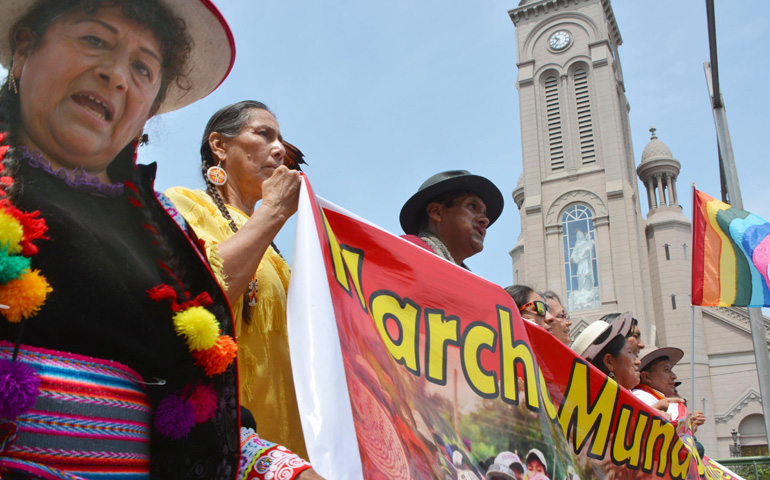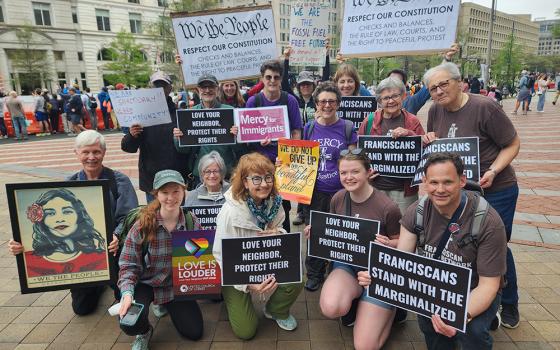
Thousands join a "People's Climate March" in Lima, Peru, Dec. 10, while international climate negotations are underway in the city. (Newscom/Kyodo)
For decades, environmental concerns existed on the outskirts of religious life, an addendum to the more familiar business of salvation.
With the growing awareness of the enormous adverse effect that human behavior is having on the health of the planet, however, environmental concerns are moving from the periphery to the center. Climate change has raised environmental activism from the category of "nice" things to do to that of "must do" for the sake of life itself.
Maturing along with the issue is the Christian understanding of creation and humans' place in the universe. In the new thinking, a revised and refined anthropology replaces a utilitarian view of earth's resources with one of complex connections and interdependence among species and with the earth itself.
Statements on the matter from denominations, the results of cooperative efforts among faiths and between religious groups and governmental and international agencies, are beginning to pour down like glacier melt.
In the Catholic world most recently, Bishop Marcelo Sánchez Sorondo, chancellor of the Pontifical Academy of Sciences, told the London-based Catholic Agency for Overseas Development, "Climate change has become a major social and moral problem, and mentalities can only be changed on moral and religious ground."
He also placed Pope Francis squarely amid the world's forces dealing with the issue when he said the Pontifical Academy of Sciences supported the idea of an environmental encyclical that might help influence decisions at two major global gatherings next year.
Vatican watchers say they expect an encyclical on the environment to be released sometime in the first part of 2015.
Any pronouncement by Francis, of course, will be but the latest in a string of strongly worded papal statements, some extremely countercultural and jarring of the status quo about the environment. No less a figure than Pope John Paul II gave the environment a central place amid church concerns in his 1990 World Day of Peace message.
At several points, John Paul emphasized that the ecological crisis is, on many levels, a moral crisis. The moral implications are most deeply apparent in "the lack of respect for life evident in many of the patterns of environmental pollution. Often, the interests of production prevail over concern for the dignity of workers, while economic interests take priority over the good of individuals and even entire peoples."
His prognosis for the health of the planet absent radical changes in attitudes and lifestyle is pessimistic; the critique of prevailing cultures, especially those of rich and highly industrialized nations, is unsparing.
A Catholic issue
If 1990 was the year a pope declared that climate change -- in this case, the language used was "gradual depletion of the ozone layer and the related 'greenhouse effect' " -- had reached "crisis proportions," the situation has only worsened in the nearly quarter of a century since. John Paul considered it a life issue at the time, but it was only tangentially, if at all, added to the pro-life agenda in the United States. The environment as an issue, however, has grown in importance in its own right.
One sign of that development is the existence of the Catholic Climate Covenant (formerly the Catholic Coalition on Climate Change), a partnership of a dozen national Catholic organizations, including the U.S. Conference of Catholic Bishops. The organization's director, Dan Misleh, worked at the bishops' conference for 11 years, the last five as director of outreach for the conference's Department of Justice, Peace and Human Development.
He left the conference in 2006 and began the coalition with the hope of becoming "the catalyst, clearinghouse and convener on all things climate and Catholic."
The organization's website contains a primer on church social teaching, papal statements regarding the environment, bishops' statements, views from a variety of experts and scholars, videos, prayers, suggestions for liturgy, and a host of other teaching tools, as well as the pledge itself.
The intent of the partnership is to make climate change "a Catholic issue, seen not as something extra but as integral to what it means to be Catholic," Misleh said in a recent interview.
He, like others, believes that achieving such integration means viewing creation in a new way. Previously, Catholics and other Christians viewed earth and the rest of creation as a gift to be exploited, all of it somehow apart from and in service to humanity. "I think the crux of the problem," he said, "is a lack of imagination about our place in the universe."
He said he hopes the highly anticipated encyclical will emphasize that humans are a part of, not apart from, creation. "We are really 'star stuff,' from the beginning of the great flaring forth," an event others would call "the big bang."
"The universe was set in motion to create humankind," said Misleh. He is especially struck by the relevance of the start of John's Gospel, "In the beginning was the Word … "
"When I read that, I read all of creation is incarnate. Everything we can see, touch, taste, feel -- everything points to the Creator. Not that humans don't have a special place and are somehow different. But there's a sense that we have to have reverence" for all of creation.
He sees a lack of reverence for life itself in "blowing tops off mountains" to mine coal, "burning fossil fuels at a completely unsustainable rate." Not to pay attention to such matters, he says, "sells creation short."
Ultimately, the strongest tie to the pro-life case, he said, is concern for future generations. Our children and grandchildren, he said, are going to encounter an earth that is "extremely different" from the one we experience. "We are entering into a whole new epoch. All the scientific studies say earth is changing, and not for the better."
For some, all the science the world can muster is less than persuasive. With an overwhelming preponderance of the most authoritative experts from around the globe agreeing on the fundamentals of climate change, the fact that it is caused by human activity and will have catastrophic consequences if drastic action does not occur, there are yet deniers in high places.
Republican Sen. James Inhofe of Oklahoma, in line to become chairman of the Senate Environment and Public Works Committee the month, has, according to a report in Mother Jones, quoted the Bible to back up his conviction that humans have anything to do with climate change. He also "has vowed to do all he can to block regulations aimed at cutting emissions," Mother Jones said.
It's a heavy lift even for those convinced of the science, because the problem presents in such enormous proportions it is difficult not only to imagine it but also to know what one might do to help stem the onslaught.
"Overall, climate change tends to be reported as abstract explanations about general tendencies and possible outcomes," writes Rebecca Solnit in a recent New York Times Magazine essay. "It's a difficult subject to tell and to take in. … A lot of it is hard to see. If you didn't pay attention to a species beforehand, you won't have noticed its decline. There's no direct, tangible way for you to know the ocean is 30 percent more acidic than it used to be, or that it is expected to rise several feet in this century and then keep rising."
A large enough frame
While religion is often the refuge of choice for deniers, it also is arguably the one discipline with a frame large enough to contain the entire creation/climate change picture.
Religious studies scholar William Dinges said it is becoming self-evident that a connection exists between the issues involved in climate change and religious belief. That wasn't entirely the case 18 years ago, when he started a course in religion and ecology at The Catholic University of America in Washington. Dinges, director of the religion and culture program in the Catholic University's School of Theology and Religious Studies, said the university honors program eventually developed a four-course sequence: the science of ecology, religion and ecology, economics and ecology, and public policy and ecology.
He believes we are at "a historic moment in which there is a lot of interesting thinking going on at a theological level, trying to come up with a new human anthropology" and ultimately "a more expansive sense of being pro-life." The switch involves moving from a "dominant theological paradigm" that always "judged creation in terms of human values" to a "more theocentric, biocentric" emphasis, in which humanity is more integrally knitted into the web of creation.
"There is something unique about the human person. We're not going to get anywhere denying that," he said, "It is a matter of how it gets accentuated."
He detects four themes driving the change in emphasis:
- A need to rethink what some call ecocide. "Humans are deeply implicated in the massive ecological destruction we are seeing."
- A growing realization of human interdependence. "We can't continue to think and act as if we are ecologically segregated from the rest of creation. Evolution unambiguously shows us we live in one community." That we don't flourish if other systems are not also flourishing tempers a predominantly anthropocentric focus.
- A recognition that creation does not exist solely for the use of humans. Creation existed long before humans arrived and "has value in and of itself independent of human utility."
- "Divine purposes encompass more than just human salvation. The rest is not just background and irrelevant to God's purposes."
Amid the daunting challenges posed by climate change, he detects a note of hope in the students coming through his classes. As a rule, they're not deniers. And if they aren't fully conversant with the details connecting religion and the environment, neither are they resistant. By college age, he said, students are sensitized to the issue, they're "getting it by osmosis," and since church officialdom is embracing the cause, "they have some sense that this has something to do with religion."
[Tom Roberts is NCR editor at large. His email address is troberts@ncronline.org.]




